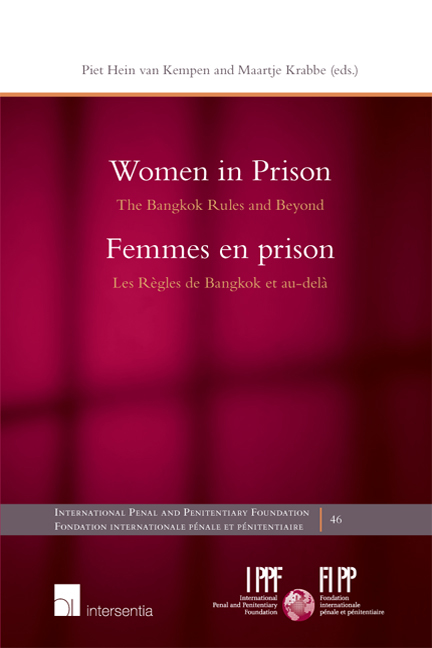Book contents
- Frontmatter
- Foreword
- Avant-propos
- Acknowledgements
- Remerciements
- Contents
- Part I Introductory Synthesis and Analyses: 1ÈRE Partie Synthèse ET Analyses Introductives
- Part II Themes: 2ÈME Partie Thèmes
- Part III National Reports: 3ÈME Partie Rapports Nationaux
- Women in prison in Argentina
- Women in prison in Australia
- Women in prison in Austria
- Women in prison in Brazil
- Women in prison in England and Wales
- Women in prison in Finland
- Femmes en prison en France
- Women in prison in Germany
- Women in prison in Greece
- Women in prison in Ireland
- Femmes en prison en Italie
- Women in prison in the Netherlands
- Women in prison in New Zealand
- Women in prison in Poland
- Women in prison in Portugal
- Women in prison in Russia
- Women in prison in South Africa
- Women in prison in Spain: their criminological and social invisibility
- Femmes en prison en Suisse: la situation des femmes prévenues et condamnées
- Women in prison in Taiwan
- Women in prison in Thailand: implementation of the UN Bangkok Rules in the Thai criminal justice system
- Femmes en prison en Turquie
- Women in prison in the USA
- Appendix The Bangkok Rules: Annexe Règles De Bangkok
- The International Penal and Penitentiary Foundation: History and Purpose
Women in prison in Spain: their criminological and social invisibility
from Part III - National Reports: 3ÈME Partie Rapports Nationaux
Published online by Cambridge University Press: 25 September 2018
- Frontmatter
- Foreword
- Avant-propos
- Acknowledgements
- Remerciements
- Contents
- Part I Introductory Synthesis and Analyses: 1ÈRE Partie Synthèse ET Analyses Introductives
- Part II Themes: 2ÈME Partie Thèmes
- Part III National Reports: 3ÈME Partie Rapports Nationaux
- Women in prison in Argentina
- Women in prison in Australia
- Women in prison in Austria
- Women in prison in Brazil
- Women in prison in England and Wales
- Women in prison in Finland
- Femmes en prison en France
- Women in prison in Germany
- Women in prison in Greece
- Women in prison in Ireland
- Femmes en prison en Italie
- Women in prison in the Netherlands
- Women in prison in New Zealand
- Women in prison in Poland
- Women in prison in Portugal
- Women in prison in Russia
- Women in prison in South Africa
- Women in prison in Spain: their criminological and social invisibility
- Femmes en prison en Suisse: la situation des femmes prévenues et condamnées
- Women in prison in Taiwan
- Women in prison in Thailand: implementation of the UN Bangkok Rules in the Thai criminal justice system
- Femmes en prison en Turquie
- Women in prison in the USA
- Appendix The Bangkok Rules: Annexe Règles De Bangkok
- The International Penal and Penitentiary Foundation: History and Purpose
Summary
INTRODUCTION
This chapter aims to take a close look at the reality of female crime in Spain. On the one hand, we analyze the singularities of this type of crime, which has, as with other neighbouring countries, experienced a significant increase in recent years. On the other hand, we focus on describing the current situation of women incarcerated in our prisons, an especially vulnerable group given their peculiarities and necessities. Lastly, the chapter establishes whether the current Spanish prison legislation echoes all or some of the United Nations Rules for the Treatment of Women Prisoners and Non-custodial Measures of Freedom for Women Offenders (Bangkok Rules, 2010). To this end, a detailed study of standards, both national and international, is essential.
INTERNATIONAL AND HUMAN RIGHTS FRAMEWORK
On 14 December 1955, during the Franco dictatorship, Spain joined the United Nations, putting an end to the international isolation that had occurred after the Second World War. On 24 November 1977, at which time the Constitution of 1978, which reinstated a democratic system, had not yet been approved in our country, Spain joined the Council of Europe, becoming the 20th State of the international organization. In the decade that followed, Spain joined NATO (30 May 1982) and the European Union (1 January 1986).
In relation to international and European conventions and treaties specifically concerning women, Spain has signed and ratified the following:
- The United Nations Convention on the Elimination of All Forms of Discrimination against Women (CEDAW 1979), signed by Spain on 17 July 1970 and ratified on 5 January 1984, as well as the Optional Protocol (CEDAW-OP, 1999), signed by Spain on 14 March 2000 and ratified on 6 July 2001. Spain made no reservations in relation to the Convention, but made a statement declaring that “[t]he ratification of the Convention by Spain shall not affect the constitutional provisions concerning succession to the Spanish crown”.
- The Council of Europe Convention on Preventing and Combating Violence against Women and Domestic Violence, adopted in Istanbul on 7 April 2011, signed and ratified by Spain on 11 May 2011.
- Type
- Chapter
- Information
- Women in PrisonThe Bangkok Rules and Beyond, pp. 697 - 722Publisher: IntersentiaPrint publication year: 2017

